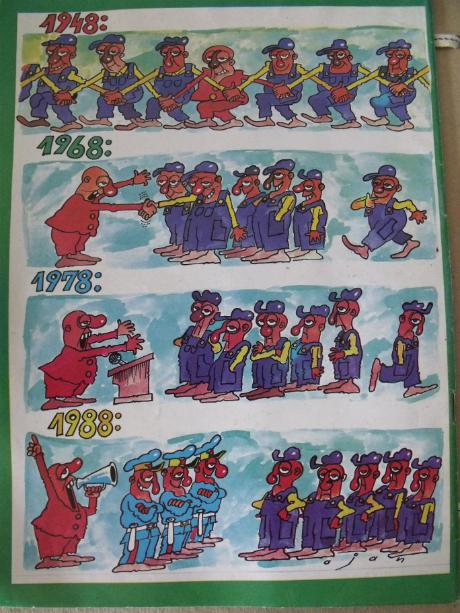Ljubica Spaskovska’s Monograph Now Available: The Last Yugoslav Generation
Posted on 24 May, 2017 in1989 after 1989 End of Yugoslavia Post Socialism Socialism Uncategorized

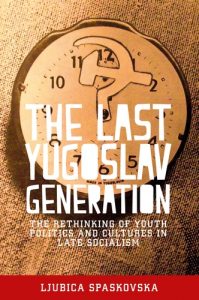 Manchester University Press have now published Dr Ljubica Spaskovska‘s new book – The Last Yugoslav Generation: The Rethinking of Youth Politics and Cultures in Late Socialism.
Manchester University Press have now published Dr Ljubica Spaskovska‘s new book – The Last Yugoslav Generation: The Rethinking of Youth Politics and Cultures in Late Socialism.
Her monograph examines the development of youth culture and politics in socialist Yugoslavia, focusing specifically on the 1980s. Rather than examining the 1980s as a mere prelude to the violent collapse of the country in the 1990s, the book recovers the multiplicity of political visions and cultural developments that evolved at the time and that have been largely forgotten in subsequent discussion. She argues that the youth of this generation sought to rearticulate the Yugoslav socialist framework in order to reinvigorate it and ‘democratise’ it, rather than destroy it altogether.
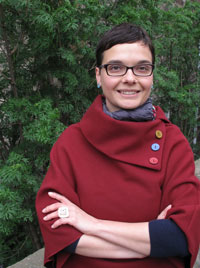 Ljubica Spaskovska is an Associate Research Fellow working on our research project 1989 after 1989 at the University of Exeter. Her research maps the history of the end of Yugoslavia’s global engagements not only as a subject/phenomenon associated with political/diplomatic history, but also as a broader societal project.
Ljubica Spaskovska is an Associate Research Fellow working on our research project 1989 after 1989 at the University of Exeter. Her research maps the history of the end of Yugoslavia’s global engagements not only as a subject/phenomenon associated with political/diplomatic history, but also as a broader societal project.
→ Purchase The Last Yugoslav Generation
Join us for our (Re)Thinking Yugoslav Internationalism Conference in Graz, 29 September – 1 October
Posted on 20 September, 2016 in1989 after 1989 End of Yugoslavia Globalisation Rethinking 1989 Socialism

Coinciding with the 55th anniversary of the Belgrade summit and the foundation of the Non-Aligned Movement, this conference will address a range of questions relating to the wealth of diplomatic, economic, intellectual and cultural encounters and exchange between 1945 – 1990, both within the Non-Aligned Movement, across the socialist world and with the developed countries. It will map the history of Yugoslavia’s global engagements not only as a subject associated with political and diplomatic
history, but also as a broader societal and cultural project.
This is a collaborative conference between ourselves and the Centre of Southeast European Studies at the University of Graz.
WHERE:
University of Graz
Meerscheinschlössl / Festsaal
Mozartgasse 3
8010 Graz
→University of Graz campus map
WHEN:
29 September 16:00 – 19:00 1 October
KEYNOTE SPEAKERS:
 Professor Kristen Ghodsee
Professor Kristen Ghodsee
Bowdoin University, USA
 Professor James Mark
Professor James Mark
University of Exeter & 1989 after 1989, UK
[Top]
Human Rights after 1945 Conference Report Published
Posted on 29 June, 2016 in1989 after 1989 Eastern Europe Globalisation Human Rights Post Socialism Rethinking 1989 Socialism

The conference Human Rights after 1945 in the Socialist and Post-Socialist World took place on the 3 – 5 March 2016 at the German Historical Institute, Warsaw. It was a collaborative conference between 1989 after 1989; the German Historical Institute Warsaw; Georg-August University of Göttingen and the London School of Economics. The aim of the conference was to highlight the role and historical agency of the socialist world in the history of human rights.
The conference report is now available on our conference pages and on Geschichte Transnational. It summarises papers presented across 6 panels covering topics such as state socialism, human rights and globalisation; how human rights is defined internationally; state socialist conceptualisation of rights and human rights; socialist foreign policy; transnational movements and flows; and political dissent in relation to the global history of human rights.
The importance of analyzing vernacular human rights, i.e. analyzing when and how people used human rights languages [5], was one of the leitmotifs of the conference. The issue of teleology and normativity in historical human rights research was another major topic. Consequently, many papers presented stories of failures that contradict positivist narratives and challenge policy-orientated narratives of democratic transition. Parallel to transnational and international human rights history, the role of the state in human rights history was another key issue of the conference. Bringing the state back in, human rights can also be seen as an element of legal history – a promising approach embedding the highly normative notion of human rights in a wider legal history context. This conference brought together scholars working on various regions and actors in a truly fruitful manner. It linked different approaches and perspectives on the history of human rights in a way that contributed to an urgently needed, more complex understanding of the socialist world’s role in human rights history.
Read the full conference report.
[Top]Human Rights after 1945 in the Socialist and Post-Socialist World Conference Programme
Posted on 29 February, 2016 in1989 1989 after 1989 Cold War Globalisation Human Rights Socialism

March 3-5, 2016
German Historical Institute Warsaw
Conference Room, 3rd Floor
Organizers:
German Historical Institute Warsaw
1989 after 1989: Rethinking the Fall of State Socialism in Global Perspective
Georg-August University of Göttingen
Synopsis
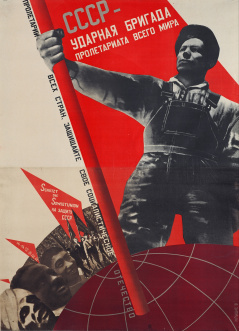 As both human rights and globalization have emerged as dynamic fields of historical and sociological research, the “socialist world” is relegated to a supporting role in the triumph of Western capitalism and liberal democracy. The aim of this conference is to question established narratives that have ignored or downplayed the role of socialist ideas, practice, and experts—be they state officials, loyal intellectuals or dissident activists — in the development of international human rights ideas, discourses, and systems in the post-war era. With a geographic scope that covers the Soviet Union, the Eastern Bloc, Yugoslavia and China, we hope to show that the socialist world did not just react passively to Western human rights politics, but was a vital participant in the production of global human rights with legacies that continued past the revolutions of 1989. By examining the socialist contribution to the evolution of human rights, we hope to contribute to revising standard narratives of globalization that focus exclusively on the perceived winners of these processes.
As both human rights and globalization have emerged as dynamic fields of historical and sociological research, the “socialist world” is relegated to a supporting role in the triumph of Western capitalism and liberal democracy. The aim of this conference is to question established narratives that have ignored or downplayed the role of socialist ideas, practice, and experts—be they state officials, loyal intellectuals or dissident activists — in the development of international human rights ideas, discourses, and systems in the post-war era. With a geographic scope that covers the Soviet Union, the Eastern Bloc, Yugoslavia and China, we hope to show that the socialist world did not just react passively to Western human rights politics, but was a vital participant in the production of global human rights with legacies that continued past the revolutions of 1989. By examining the socialist contribution to the evolution of human rights, we hope to contribute to revising standard narratives of globalization that focus exclusively on the perceived winners of these processes.
Conference Programme
Thursday, 3 March 2016
14:00-14:30
Welcoming Address
Ruth LEISEROWITZ (German Historical Institute Warsaw)
14:30-15:30
Introductory Panel: State Socialism, Human Rights and Globalization: In Search of a New Narrative
Hella DIETZ (Georg-August University of Göttingen)
Ned RICHARDSON-LITTLE (University of Exeter)
Robert BRIER (London School of Economics)
15:30-16:00 Coffee break
16:00-18:00
Panel 1: Defining Human Rights Internationally
Steven JENSEN (Danish Institute for Human Rights)
Defining the Social in the Global: Social Rights, UN Diplomacy and the Emergence of International Non-Discrimination Norms and Politics, 1950-1960
Alexander OSIPOV (European Centre for Minority Issues)
The Soviet Union’s Involvement in the Establishment of the European Minority Rights Regime
Discussant: Arnd BAUERKÄMPER (Free University Berlin)
19:00 Conference Dinner
Friday, 4 March 2016
09:00-11:00
Panel 2: State-Socialist Conceptions of Rights and Human Rights
Jennifer ALTEHENGER (King’s College London)
Rights, Not Human Rights: Communist China’s National Constitution Discussion, 1954
Michal KOPEČEK (Institute for Contemporary History, Prague and Charles University, Prague)
Socialist Conceptions of Human Rights and its Dissident Critique
Todor HRISTOV (University of Sofia)
Rights to Weapons: Human Rights as a Resource in Workplace Conflicts in Late Socialist Bulgaria
Discussant: Paul BETTS (Oxford University)
11:00-11:30 Coffee Break
11:30-13:00
Panel 3: Tolerance, Difference, and Rights under Socialism
Ivan SABLIN (University of Heidelberg)
Illusive Tolerance: Buddhism in the Late Soviet State
Zhuoyi WEN (Hong Kong Institute of Education)
Contesting Cultural Rights in Post-socialist China
Discussant: tba
13:00-14:30 Lunch break
14:30-16:00
Panel 4: Human Rights as Socialist Foreign Policy
Sebastian GEHRIG (Oxford University)
The Fifth Column of the Third World? The East German Quest for International Recognition through UN Rights Discourses
Jens BOYSEN (German Historical Institute Warsaw)
Polish Engagement in the United Nations as a Tool for Justifying Communist Rule in Poland and Gaining Leeway in the Warsaw Pact
Discussant: Robert BRIER
(London School of Economics)
16:00-16:30 Coffee Break
16:30-18:00
Panel 5: Transnational Movements and Flows
Christie MIEDEMA (University of Amsterdam)
Negotiating Space for International Human Rights Activism: Amnesty International in Eastern Europe before 1989
Rósa MAGNÚSDÓTTIR (University of Aarhus)
Soviet-American Intermarriage: Transnational Love and the Cold War
Discussant: James MARK (University of Exeter)
19:00 Dinner for the conference participants
Saturday, 5 March 2016
9:00-11:00
Panel 6: Dissent and Human Rights
Simone BELLEZZA (University of Eastern Piedmont)
The Right to Be Different: Ukrainian Dissent and the Struggle Against a Global Consumerist Cultural Standardization
Hermann AUBIÉ (University of Turku)
Between Loyalty and Dissent: Revisiting the History of Human Rights in China Through the Discourse of Chinese Intellectuals and Dissidents
Zsófi a LÓRÁND (European University Institute, Florence)
Feminist Dissent, Activism for the Elimination of Violence against Women, and the Human Rights Discourse in Yugoslavia in the 1970s-1980s
Discussant: Celia DONERT (University of Liverpool)
11:00-11:30 Coffee Break
11:30-13:00
Concluding Panel: The Place of State Socialist Societies in the Global History of Human Rights
Paul BETTS (Oxford University)
James MARK (University of Exeter)
Celia DONERT (University of Liverpool)
Call for Papers: (Re)Thinking Yugoslav Internationalism – Cold War Global Entanglements and their Legacies
Posted on 14 December, 2015 in1989 after 1989 Cold War End of Yugoslavia Globalisation Rethinking 1989 Socialism

Graz, Austria
Centre for Southeast European Studies, University of Graz and the University of Exeter
30 September – 1 October 2016
Call for Papers Deadline: 28 February 2016
(Re)Thinking Yugoslav Internationalism – Cold War Global Entanglements and their Legacies
For more than forty years, Yugoslavia was one of the most internationalist and outward looking of all socialist countries in Europe, playing leading roles in various trans-national initiatives – principally as central participant within the Non-Aligned Movement – that sought to remake existing geopolitical hierarchies and rethink international relations. Both moral and pragmatic motives often overlapped in its efforts to enhance cooperation between developing nations, propagate peaceful coexistence in a divided world and pioneer a specific non-orthodox form of socialism.
Although the disintegration of socialist Yugoslavia has received extensive treatment across a range of disciplines, the end of Yugoslavia’s global role and the impacts this had both at home and abroad, have received little attention. Coinciding with the 55th anniversary of the Belgrade summit and the foundation of the Non-Aligned Movement, this conference seeks to open up a range of questions relating to the wealth of diplomatic, economic, intellectual and cultural encounters and exchange between 1945 – 1990, both within the Non-Aligned Movement, across the socialist world and with the developed countries. It would map the history of Yugoslavia’s global engagements not only as a subject associated with political/diplomatic history, but also as a broader societal and cultural project. Important witnesses involved in those exchanges and alliances will also be invited to share their experiences.
We welcome papers from different disciplines and from diverse perspectives, whether dealing with aspects of Cold War international cooperation, development, Yugoslavia’s global role, or the ‘global’ Cold War from the perspective of the developing world and the ‘global South’. We particularly encourage proposals which would reflect on:
- the roots of Yugoslav internationalism and how it was understood in cultural/economic/social as well as political/diplomatic terms;
- the contours of Yugoslav diplomacy and the ways Yugoslav elites conceptualised their global role;
- the role of Yugoslavia in the United Nations, its agencies and other international organisations as the fora for global encounters and in particular the attempts at tackling global inequality and alternative development;
- the relationship between Yugoslavia, the different liberation movements and the newly emerging independent nations in the ‘global South’ (including cultural diplomacy, labour migration, individual travel);
- the realities and challenges of foreign trade, investment construction and economic cooperation;
- the ways international engagements reshaped aspects of political, economic or cultural life back in Yugoslavia;
- the role and significance of the Non-Aligned Movement during the Cold War and today;
- the international impact of the end of Yugoslavia and the collapse of her global role;
- the legacies and new understandings of Yugoslavia’s global role.
Abstracts of 300-500 words, together with an accompanying short biographical note should be submitted to Natalie Taylor (N.H.Taylor@exeter.ac.uk) by 28 February 2016.
Funding opportunities for travel and accommodation are available, but we ask that potential contributors also explore funding opportunities at their home institutions.
This event is kindly supported by the Centre for Southeast European Studies and the Leverhulme Trust-funded project 1989 after 1989: Rethinking the Fall of State Socialism in Global Perspective at the University of Exeter.
[Top]‘Death to fascism, freedom to expression!’ – The Post-Yugoslav Media and Freedom of Speech
Posted on 3 November, 2014 in1989 after 1989 End of Yugoslavia Human Rights

By Ljubica Spaskovska
The transition to democracy should have liberated the media in the former Yugoslav states, but in many ways the situation has actually gotten worse.
‘In these times/when everything is silent/In these times/I say – freedom/ And I see fear…’
This verse from the song entitled ‘Freedom’ is one of the tracks from an album by the Macedonian band ‘Reporters’ made up exclusively of journalists of different ethnic backgrounds. Under the slogan ‘Solidarity for freedom’, the Independent trade union of journalists and media workers, with the support of the US Embassy launched a campaign meant to incite a debate on freedom of speech, on the state of the media in Macedonia and solidarity among journalists. Over the past few weeks, both Macedonia’s and Serbia’s Independent Journalists’ Associations (members of the International Federation of Journalists) have raised concerns about similar phenomena through calls for a public hearing on media freedom or through the organisation of debates, conferences and concerts.
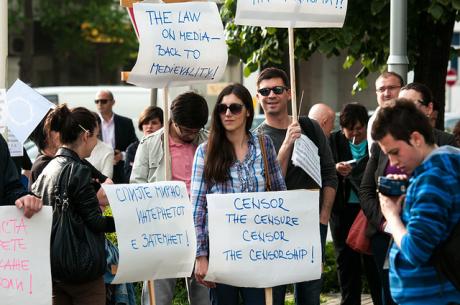
Indeed, the 2014 EU progress reports for all of the post-Yugoslav states aspiring to EU accession (Bosnia-Herzegovina, Montenegro, Serbia, Kosovo, Macedonia) underline a trend of serious deterioration of media freedom. Almost quarter of a century after the disintegration of Yugoslavia and the introduction of electoral, multi-party democracy, these societies have been witnessing a progressive narrowing down of public, intellectual and media spaces for free debate and reporting. Political and financial pressures, intimidation and threats against journalists and editors in Bosnia, self-censorship, threats and violence against journalists in Serbia, Montenegro and Kosovo, and government influence on media exercised through state-financed advertising in Macedonia have been observed in a context of a scarcity of real commitment on the part of political elites to tackle this problem and take the recommendations from the progress reports seriously.
Over the years, different governments have managed to blur the line between the ruling party/coalition and the state and to deprive state institutions of their independence. Moreover, they have turned an increasing number of media outlets into channels for dissemination of their political ideology or attacks on political opponents. For instance, the State Department Macedonia Country Report on Human Rights Practices for 2013 noted that members of the Association of Journalists of Macedonia reported pressures ‘to adopt a pro-government viewpoint in their reporting or lose their jobs.’
In Macedonia, further grievances were aroused by the detention and conviction of journalist Tomislav Kežarovski for revealing the identity of a protected witness in a story written in 2008. Civil society activists, local journalist associations and opposition leaders have constantly referred to reports by international bodies and governments that had condemned the trial and Kežarovski’s imprisonment in order to give legitimacy to their protest, albeit to little avail.
Moreover, the State Department Country Report lists Kežarovski’s case in the section entitled ‘Political Prisoners and Detainees’. The OSCE Representative for the Freedom of the Media, as well as the European Federation of Journalists similarly condemned the long sentence. Hence, it comes as no surprise that in the 2014 World Press Freedom Index Macedonia sits in 123rd place and has never been so low in the Index (the lowest in comparison to the other former Yugoslav states).
However, the state of the media is only a symptom of wider societal phenomena such as growing intolerance toward ‘oppositional’ voices and certain frozen narratives which seek to uncritically glorify the nation, the state, the ruling ideology and demonize the socialist/Yugoslav past. Croatia and Slovenia are the only two former Yugoslav republics which are members of the European Union. Although considerably higher on the World Press Freedom Index, neither Slovenia nor Croatia have been immune to the (re)establishment of a certain dogmatism in interpreting or discussing about the past.
A case in point is the recent decision of Croatian President Ivo Josipović to fire his main analyst professor Dejan Jović for an article in the academic journal Political Thought. Entitled ‘Only in myths every nation desires its own state’ and comparing the Scottish independence referendum and the Yugoslav referenda of the early 1990s, Jović argued that the latter were illiberal and did not allow for a genuine debate and consideration of all political opinions and visions for Yugoslavia’s future.
Similarly, the MPs of the conservative Slovenian Democratic Party (SDS) proposed a dismissal of the president of the Slovenian national assembly Dr. Milan Brglez for qualifying Yugoslavia in an interview as a state that had credibility and prestige in the international community and that the Slovenian independence in that sense was a step backwards.
Why, a quarter of a century after the first multi-party elections in the former Yugoslavia, are there still certain dogmatic ‘truths’ in most of the successor states, where freedom of expression is not an accomplishment, but, rather, something yet to be realised?
An obvious reason which is often evoked as the main factor is the socialist past itself. However, this can only offer a partial explanation and it could be counter-productive, as it fails to put the burden of responsibility on contemporary policy-makers and elites. Moreover, from 1950 practices of pre-censorship had been abolished in socialist Yugoslavia. It was the public prosecutor who could act only ex-post facto, after a broadcast, publication or film presentation. By the mid-1980s, the Yugoslav media network was significantly fragmented, decentralised, yet numerically impressive.
In 1987, Yugoslavia had 2,825 newspapers and 202 radio and TV stations. Hence, it was virtually impossible to sanction all acts which were classified as ‘verbal crime’ under the notorious ‘Article 133’ which criminalised acts of ‘hostile propaganda’, but was also meant to curb nationalist discourse, channelling what Lenard Cohen identified as ‘Yugoslav communism’s strong antipathy to overt nationalist tactics’.[1] Moreover, the 1980s saw the reinvigoration of the debate on freedom of speech and on the abolishment of the verbal crime. Although restrained, debate did occur in different fora.
For instance, in 1981 the president of the Federal Court in an article in a law journal acknowledged that the formulation of ‘Article 133’ was not precise, while at the 1983 conference of Yugoslav criminologists several professors of law called for the repeal of the article.[2] Several years later, as a young journalist in one of the principal magazines of the League of Socialist Youth, Dejan Jovic argued that the organisation (which in fact financed the magazine) should be abolished [3]. Back then, he was not sacked for his opinion.
Twenty-five years later, both old and new generations of journalists, intellectuals, students and activists are fighting battles which would have normally belonged to a distant past. When on 9 May last year, on the occasion of Europe Day, representatives of the ‘Front for Freedom of Expression’ gathering a number of civil society organizations and initiatives staged a protest in front of the seat of the delegation of the European Union to Macedonia, they chose as their slogan a creative remake of an old motto of the partisan resistance movement: ‘Death to fascism, freedom to expression!’.
References:
[1] Lenard Cohen, The Socialist Pyramid Elites and Power in Yugoslavia(Oakville/New York/London: Mosaic Press, 1989), p.445.
[2] Yugoslavia: Prisoners of Conscience (London: Amnesty International Publications, 1985), p.29.
[3] Dejan Jović, ‘Kad bi SSOJ postojao, trebalo bi ga ukinuti (1)’ Polet 402, 10.2.1989.
[Top]The Future of the Past: Why the End of Yugoslavia is Still Important
Posted on 31 March, 2014 in1989 after 1989 End of Yugoslavia

By Ljubica Spaskovska
A new socialist model is emerging in the western Balkans. Can its political vocabulary transcend the ethno-national dividing lines in the region?
‘New project for democratic socialism in Yugoslavia’ read the title of the resolution for the last congress of the League of Communists of Yugoslavia. It was January 1990.
As the Yugoslav Party was writing the last pages of its seventy-year old existence, few were left who believed in the viability of the project of democratic socialism. ‘The liberal utopia which underpinned 1989’ was the idealized way the socialist East and South imagined ‘the West’ and liberal democracy. In the aftermath of the last Yugoslav party congress, even fewer could imagine that ‘democratic socialism’ could ever be resurrected as a viable political project.
Almost a quarter of a century later, however, the Slovenian ‘Initiative for democratic socialism’, the Democratic Labour Party and the Sustainable Development Party have announced the establishment of a ‘United Left’ coalition. These non-parliamentary leftist groups will present their bid for a new socialist model in Europe at the upcoming EU elections in May. While the recent wave of protests in Bosnia-Herzegovina, and on a smaller scale in Macedonia, have raised social concerns and acted as a vent for rebellion against the political and economic mismanagement by elites, Kosovan students at the University of Prishtina made a strong case against structural corruption and fraud, eventually succeeding in deposing the Rector.
Many of those who found themselves at the forefront of these ‘acts of citizenship’ have been young people who came of age in the post-socialist period. The Kosovan student protesters, the Macedonian activists for social justice in the leftist groups ‘Solidarity’ and ‘Lenka’, the organizers of the Zagreb Subversive Forum, and the activists in the Slovenian Initiative for democratic socialism, belong in a pool of activists groups, initiatives or centres for research that espouse progressive politics while they have sought to deconstruct the ‘liberal utopia’ of the post-socialist period. They are unquestionably part of a new political generation (or, a ‘generation unit’, to use Mannheim’s terminology) whose political subjectivities, demands and visions represent a departure from those that twenty-five years ago ushered in the post-Yugoslav era.
How to account for this sudden post-Yugoslav outburst of social discontent and the resurrection of a long-forgotten vocabulary, where social rights, democratic socialism, the working class and the dispossessed feature rather prominently? Beside the generational factor, one possible answers lies in the concluding paragraph of last month’s open letter to the international community signed by 130 scholars and academics from around the world:
“In [the] spring of 1992, Bosnian citizens staged in Sarajevo the largest demonstrations ever against all nationalist parties. They were silenced by snipers, and their voices, from that point on, ignored by the international community. This time, the world should listen.”
Indeed, the conventional narrative of the 1980s, as the climax of political skirmishing and ethnic hostility, has so far managed to conceal a major stream of critique that was silenced by the subsequent armed conflicts and progressively erased in the new nation-states. The last Yugoslav public opinion survey conducted in 1990, from a sample of 4,230 adults, revealed clear divisions along lines of ethno-national belonging.
However, there was one part of the survey where Yugoslav citizens appeared strikingly unanimous. Namely, respondents were asked if expenditures on education, culture, healthcare and social security should be reduced. 74% of Bosnians, 66% of Montenegrins, 81% of Croatians, 71% of Macedonians, 72% of Slovenes, 79% of Serbs, 80% of Kosovans and 84% of Vojvodinians said this budget should be either increased or the present level of spending should be maintained. Moreover, the survey found that the ‘democratic optimism’, i.e. a support for a multi-party system was highest among Kosovans and Slovenes (19%) and lowest in Bosnia-Herzegovina (4%). Indeed, respondents from ethnically-mixed regions expressed fears that a multi-party system would exacerbate inter-ethnic divisions.
One of the spheres where many of these debates took place during the 1980s was the Yugoslav press and, in particular, the so far scarcely researched youth press. A commitment to exposing socio-economic structural inequalities and forms of corruption, especially among top Party officials, came to define the increasingly vocal youth press that was subject as a result to ongoing bans, trials and public discrediting throughout the 1980s. This led foreign scholars to observe that:
“Of all the periodical publications appearing in Yugoslavia, it is the youth press which has proven the most consistently nettling to the authorities. Outspoken to the point of rebelliousness, the young editors […] have repeatedly ignored even the most fundamental taboos”.
Pedro Ramet, ‘The Yugoslav Press in Flux’, in Pedro Ramet (ed.) (1985), Yugoslavia in the 1980s, p.111
Young journalists tended to link these phenomena to the authoritarian traits of Yugoslav socialism, in particular the Party’s elites and their monopoly on power. In December 1984, for instance, the Croatian youth magazine Polet published an ironic call for the ‘Big, bigger, the biggest Yugoslav competition for the photograph of the most beautiful, richest, most luxurious and most unavailable house for the working class on the territory of the former Yugoslavia’, printed over a black and white photo of a big mansion. It also noted that ‘precedence will be given to the photographs which will also supply information about the location, the size, the owners and their occupation’. Four years later, the main Bosnian youth magazine Naši dani was at the helm of a big public debate which exposed the practice of building summer villas by high Bosnian political officials at the sea-side resort of Neum. One article unreservedly attacking high-ranking politicians put forward demands which could be heard in a modified form at recent protests: ‘To nationalise what had been robbed. To take away once and for all from the red bourgeoisie and give to the working class’. Finally, a similar affair burst into the open when Slovenian youth magazine Mladina accused the federal Minister of Defense of having a summer villa constructed for himself by army recruits in the sea resort of Opatija.
As the decade drew to a close and the Yugoslav sonderweg led many to believe that the multi-level crisis was a dead-end street and that violence was looming, many voices warned at the prospect of elites capitalizing on social discontent and posing as national saviours. Even regions like Macedonia, which were later spared from the violence of the dissolution conflicts, were mired in a new nationalist rhetoric and calls for prohibition of ethnic minorities’ political parties. The way the editor-in-chief of the youth magazine Mlad borec, Nikola Mladenov targeted the rise of nationalism in his editorials, both at Yugoslav and local level, captures this:
“As if it became a civic duty to propagate national tragedy and vulnerability. In place of one collectivity – the class, we are being offered another one – the nation, the easiest way of manipulating the emotions of tomorrow’s voters. The propagating of one’s one history – always the most bloody and most difficult – hasn’t bypassed us either […]”
For two and a half decades former Yugoslavs were repeatedly reminded of their national tragedies, bloody histories, or their victimhood at the hands of neighbours. They were encouraged, if not forced, to erase out of their memories and identities that other collectivity – the class. What the Bosnian student magazine Valter wrote in 1990 indeed reads like a prophecy:
“We should not have any doubts that this is a period where we’ll see a formal change of government, accompanied by strong disillusionment of manipulated voters. Because exclusive anti-communism does not imply automatic creativity; on the contrary, the motives are quite banal and easily recognisable – taking power.”
A generational shift, growing inequality, deterioration in living standards and the withering away of social rights have undoubtedly proved crucial for the emergence of a new political vocabulary and a range of demands which appear to neglect, if not transcend, the ethno-national frame. However, it remains to be seen whether the social(ist) utopia that underpins this shift is going to successfully restore some of the betrayed hopes of the late 1980s.
Bibliography:
George Lawson, Chris Armbruster and Michael Cox (eds.), The Global 1989: Continuity and Change in World Politics (Cambridge University Press, 2010).
Ljuljana Baćević, et al. Jugoslavija na kriznoj prekretnici (Beograd: Institut društvenih nauka/Centar za politikološka iztraživanja i javno mnenje, 1991).
Pedro Ramet, ‘The Yugoslav Press in Flux’, in Pedro Ramet (ed.), Yugoslavia in the 1980s (Westview Press, 1985), p.111.
‘Veliki, veći, najveći’, Polet 292, 21.12.1984, p.10.
Radmilo Milovanović, ‘Neum ili dolje crvena buržoazija’, Naši dani 949, 2.9.1988, p.7.
Nikola Mladenov, ‘Народе македонски’, Mlad borec 1971, 07.03.1990.
Goran Todorović, ‘Sveti Ante’, Valter 28, 17.4.1990, p.2.





